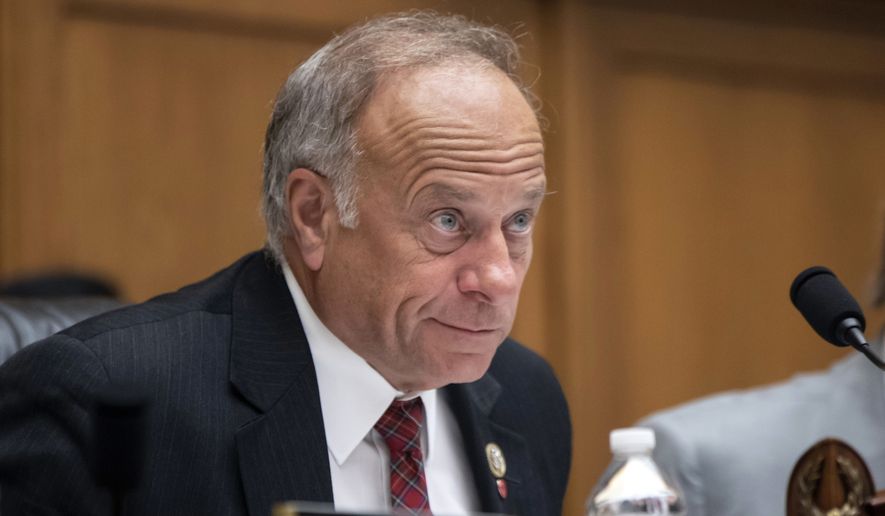OPINION:
Rep. Steve King from Iowa has become a pariah on Capitol Hill, distanced by Democrats and his own party Republicans alike for wondering aloud, during an interview with The New York Times, this question: “White nationalist, white supremacist, Western civilization — how did that language become offensive? Why did I sit in classes teaching me about the merits of our history and our civilization?”
The congressman ought to have chosen his words much more carefully when talking with The New York Times.
He admits as such. He’s issued a statement denying any support for white supremacy and clarifying only his regard for “Western Civilization’s values,” but he lost his committee assignments just the same. He’s also said he made a “freshman mistake” by taking a “call from a New York Times reporter,” Yahoo News reported.
Still, he’s not running scared from his comments.
“I want to make one thing abundantly clear: I reject those labels and the evil ideology that they define,” King said, the Sioux City Journal reported. “Further, I condemn anyone that supports this evil and bigoted ideology which saw in its ultimate expression the systematic murders of 6 million innocent Jewish lives. … [But] I profoundly believe that American is the greatest tangible expression of [Western Civilization’s values] the World has ever seen. Under any fair political definition, I am simply a Nationalist.”
And what’s wrong with that?
Nationalism in itself is neither shameful nor racist. It’s patriotic; it’s a love of sovereign country and home.
This hasn’t stopped The New York Times, however, from going after King with a followup piece supposedly listing his “long history of racist comments and insults about immigrants.”
Blood in the water.
But First Amendment free speech defenders, beware. What’s included in this so-titled “Timeline” of “Steve King’s Racist Remarks and Divisive Actions” are numerous quotes and citations that are, by and large, anything but.
Some examples: In 2002, while serving in the Iowa State Senate, King filed a bill requiring that schools teach that America “is the unchallenged greatest nation in the world and that it has derived its strength from … Christianity, free enterprise capitalism and Western civilization.” King, in that same year, pushed for a law making English the official language of his state — and three years later, as U.S. congressman, did the same for the whole country. In 2006, King characterized the deaths and killings of U.S. citizens by illegals as a “slow-moving Holocaust” and at a rally, cited statistics — disputed by some, supported by others — that 25 Americans die each day at the hands of illegals.
(Just for interest, a grieving father who lost his son in a wreck with an illegal — who then tried to flee the scene — conducted independent research and reported, in 2016, that up to 7,500 Americans, or 20 per day, are killed each year by unlicensed drivers, more than half of which he claimed were illegals. That’s just deaths due to driving accidents.)
The New York Times went on, blasting King for describing how he’d put an electrified wire on top of the border wall; for aligning himself with Dutch politician Geert Wilders and France’s Marie Le Pen; and for several statements about the need to preserve Western civilization culture.
Like him or not, agree with him or not, the fact is, King’s running theme is all about preserving the country as Founding Fathers envisioned — as a limited government democratic-republic, capitalistic and free market in nature, where individual rights are rooted in God and by birth, not bestowed by government.
He may stick his foot in his mouth with his wording — but really, not so often as the media would have believed. It’s the media twisting that usually brings the thunder.
More often than not, King’s words are simply and solely blunt calls for a return to constitutional governance, bold warnings about the pitfalls of open borders and stark predictions about the loss of Western culture.
The New York Times may find all that offensive and divisive and racist. But there’s a whole host of Americans who agree with King. And guess what? They’re not members of a white supremacist group. They’re simply citizens, trying to hold on to a country they love — to the country that founders imagined. Oftentimes, in a word: They’re conservatives.
Let’s not let the burial of King morph into a mass funeral for conservatism over words and ideologies the media cannot stand.
• Cheryl Chumley can be reached at cchumley@washingtontimes.com or on Twitter, @ckchumley.




Please read our comment policy before commenting.